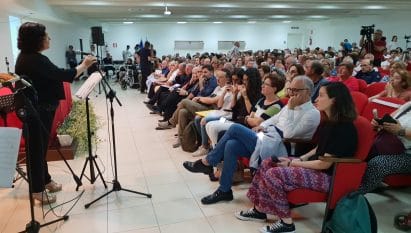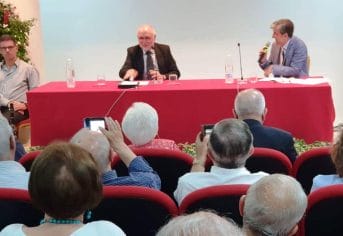A strong appeal for a Europe that is open, inclusive and dialogic launched by the president and co-president of the Focolare Movement at Matera, European Capital of Culture 2019. Let the “city of the Sassi” be a living model for a more harmonious, just and fraternal coexistence – this was the challenge launched by Maria Voce and Jesús Morán during a conference held at Matera, European Capital of Culture 2019, this Saturday June 22, 2019. This conference entitled “Living time and space: the Culture of Unity at the service of the City” was organized by the Focolare community and the Elicriso di Matera Association. In their strong message, the president and co-president of the Focolare Movement invited the old continent of Europe to rediscover its mission: show the world that diversities can coexist without differences being suppressed and identities violated.  About 550 people participated in this conference, amongst them Antonio Giuseppe Caiazzo, the Archbishop of Matera-Irsina, and Giovanni Oliva, Secretary General of the Matera Basilicata 2019 Foundation. Maria Voce, who spoke about the “culture of unity” promoted worldwide by the Focolare community through the concrete aspects of city life, posed the question: how can we live “a culture of dialogue, hospitality, fraternity” today in the fields of economy and work, interculturality, social ethics, health and environment, art, human formation or modern means of communication? The president gave an answer to this question by quoting examples of cities where – even through the commitment of Focolare members – citizens discover their city’s “vocation” through generous love towards neighbour and community, through being “active and co-responsible citizens” and through living “together the art of participation”. Sulcis Iglesiente in Sardinia was one of the examples quoted. The Focolare community and other pacifist movements in this city set up a committee to work together for the reconversion of a company that produces weapons. Another example quoted was Poland. The public administrator in the Council of Upper Silesia speaks of a Poland that is neither closed nor sovereign and of cities where the collaboration between religious communities and non-governmental organizations helps Ukrainian immigrants to integrate. But increase in citizens’ participation is not enough to rebuild the 21st century cities, concluded the Focolari president. The politicians’ specific contribution is essential; they are called to practice “the love of all loves”, an expression used by Chiara Lubich to define political commitment. In other words, politicians are the first ones called to provide the means for individuals and groups to be fulfilled and to create spaces where their resources and initiatives can be gathered into the unity of a common design, just like the colours that compose the rainbow.
About 550 people participated in this conference, amongst them Antonio Giuseppe Caiazzo, the Archbishop of Matera-Irsina, and Giovanni Oliva, Secretary General of the Matera Basilicata 2019 Foundation. Maria Voce, who spoke about the “culture of unity” promoted worldwide by the Focolare community through the concrete aspects of city life, posed the question: how can we live “a culture of dialogue, hospitality, fraternity” today in the fields of economy and work, interculturality, social ethics, health and environment, art, human formation or modern means of communication? The president gave an answer to this question by quoting examples of cities where – even through the commitment of Focolare members – citizens discover their city’s “vocation” through generous love towards neighbour and community, through being “active and co-responsible citizens” and through living “together the art of participation”. Sulcis Iglesiente in Sardinia was one of the examples quoted. The Focolare community and other pacifist movements in this city set up a committee to work together for the reconversion of a company that produces weapons. Another example quoted was Poland. The public administrator in the Council of Upper Silesia speaks of a Poland that is neither closed nor sovereign and of cities where the collaboration between religious communities and non-governmental organizations helps Ukrainian immigrants to integrate. But increase in citizens’ participation is not enough to rebuild the 21st century cities, concluded the Focolari president. The politicians’ specific contribution is essential; they are called to practice “the love of all loves”, an expression used by Chiara Lubich to define political commitment. In other words, politicians are the first ones called to provide the means for individuals and groups to be fulfilled and to create spaces where their resources and initiatives can be gathered into the unity of a common design, just like the colours that compose the rainbow.  Interviewed by RAI journalist Gianni Bianco, Jesús Morán explained in depth all about his commitment towards fraternal coexistence in our cities, particularly in Europe. The co-president of the Focolari declared his firm belief that Europe is called to be “a model for all the world unification projects”. Morán affirmed that to fulfil such a vocation, Europe needs to go back to its Christian roots, to a Christianity whose great prophecy is “universal brotherhood”. He continued to explain that universal brotherhood motivates “processes, that have their own roots and identities but are inclusive and open to dialogue, and so one discovers that people of diverse status, religion or ideology are able to participate in them”. The president and co-president of the Focolare Movement expressed their great aspirations for Matera: “The capital city of a culture of unity”, “a new city” that may able to contribute towards “recomposing in unity the project for our Europe and for the human family”.
Interviewed by RAI journalist Gianni Bianco, Jesús Morán explained in depth all about his commitment towards fraternal coexistence in our cities, particularly in Europe. The co-president of the Focolari declared his firm belief that Europe is called to be “a model for all the world unification projects”. Morán affirmed that to fulfil such a vocation, Europe needs to go back to its Christian roots, to a Christianity whose great prophecy is “universal brotherhood”. He continued to explain that universal brotherhood motivates “processes, that have their own roots and identities but are inclusive and open to dialogue, and so one discovers that people of diverse status, religion or ideology are able to participate in them”. The president and co-president of the Focolare Movement expressed their great aspirations for Matera: “The capital city of a culture of unity”, “a new city” that may able to contribute towards “recomposing in unity the project for our Europe and for the human family”.
Joachim Schwind




0 Comments